After four days of trying to order food online to no avail, a man of about 30 from Shanghai’s Yangpu district called the police. The sealed-in resident wanted to know if he would get fed if he charged out of his residential compound and got arrested for breaking quarantine rules.
His food purchase placed through the local neighborhood committee six days earlier had never arrived, and the hunger was giving him stomach cramps, he said.
“The neighborhood committee told me to ‘endure.’ I have endured four days. All that’s edible is gone except for water,” he told the police in a call, the recording of which he later posted online. “Every evening, when I tune in to the news at 7 p.m., all is portrayed as peaceful and well and brimming with a sense of security. I don’t know about this security.”
But the police’s answer dashed any hopes for a food source. Even if he got arrested, they would just send him right back home, the officer said, noting that the police station couldn’t accommodate him either.
The man’s desperate attempt to fend off starvation represents a microcosm of the suffering experienced by many residents in Shanghai amid a lockdown that the communist regime has imposed, insisting that it’s the key to containing a surging Omicron outbreak. Residents in some districts have been sealed inside their homes for more than a month.
City authorities only started easing lockdowns on April 11, under mounting pressure. But the hardline policies have crippled the city’s economy and wreaked havoc. In the Chinese financial hub that’s home to 26 million people, feelings of hunger, frustration, and desperation are taking hold.
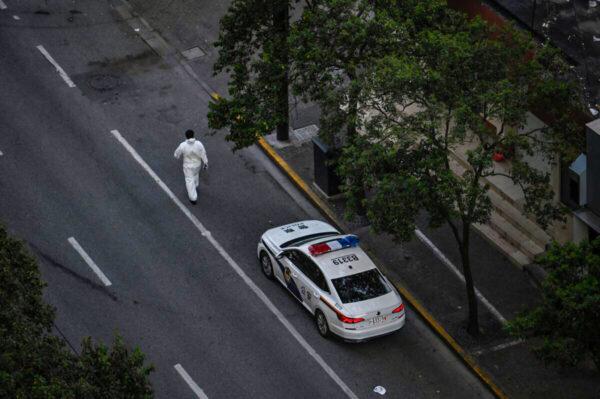
Starving locals have taken to banging pots and pans from their balconies while screaming out demands for food.
From the quarantine centers, disturbing videos have emerged of people being locked in half-finished facilities with poor sanitary conditions. One person complained about dozens of people having to share a single clogged toilet.
Despite these restrictive measures, the outbreak appears nowhere close to being under control. Virus cases in the city hovered at above 20,000—more than five times the number reported in late March, when the lockdown first went into effect—for six days straight ending on April 12. However, experts and locals have consistently questioned whether the official figures can be trusted.
No One Spared
Food is a top question plaguing the minds of Shanghai’s sealed-in residents. Empty grocery shelves, scant provisions from authorities, and unreliable delivery have kept residents on edge, despite the city government’s repeated assurances that supplies are bountiful.“Officials, please put down your script. Show us now how you order vegetables with your phones,” a local resident said in a post on Weibo, a popular Chinese social media similar to Twitter, in response to a news report on a recent Shanghai press conference.
The user hasn’t been alone in feeling the vexation. Many in Shanghai have been staying up until midnight or rising before 6 a.m. to load their online shopping carts with produce—often at exorbitant prices—only to find their orders canceled at the moment of hitting the purchase button. Even for those who were successful, some found their items’ delivery date pushed back time and again, with their orders at times not arriving until several weeks later.
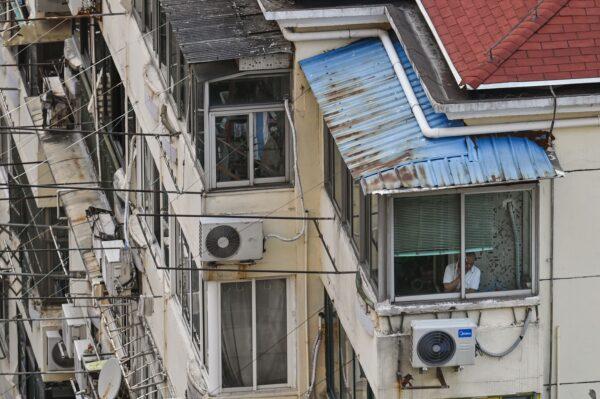
Nor have the rich been spared from the sting. Billionaire Cathy Xu Xin, dubbed queen of China’s venture capital, has stakes in multiple food shopping apps now essential for Chinese residents under lockdown. Xu recently asked neighbors to add her to an online bulk buying group for milk and bread to supply a large household, she said in a social media post.
In a chat group for Tomson Riviera, an upscale housing complex of 220 people with apartments valued at tens of millions of dollars, one user told others to try their luck in the afternoon if their morning efforts at buying weren’t fruitful. There may be “surprises” if they spend more time on the shopping apps, the user said.
Another in the same chat group, noting how they had been reduced to partaking in online food fights day in and day out, said in an online post, “I don’t know where my dignity is.”
Amid their struggles to obtain food, footage has emerged showing truckloads of donated produce going straight to landfills, further inflaming public anger.
The truckers haven’t been able to find a home for these goods. In videos circulating on Chinese social media, exasperated truck drivers from other provinces shouted at authorities over the phone after finding themselves—and the donated food they had hauled from hundreds of miles away—stranded on the streets.
“Forget about how expensive the goods are, I’m using my life to support Shanghai, but now I’m left with no water nor food,” one of the truckers from the port city Qingdao in eastern Shandong Province said from a parking lot where he had waited for more than a day after his arrival, his voice raised, one viral video shows.
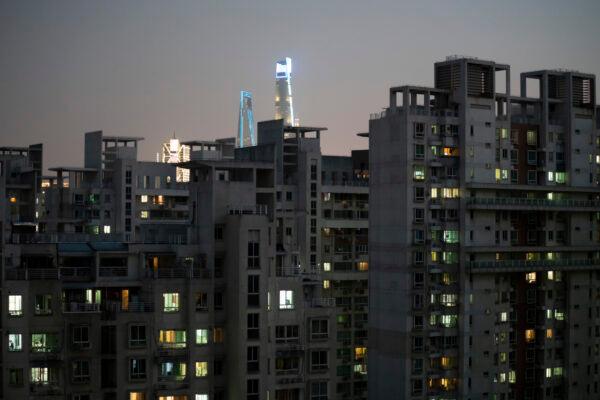
Deaths and Quarantine
Avoiding starvation isn’t the only thing Shanghai residents have had to worry about. Children have been separated from their parents if they showed different COVID-19 test results. Seniors have struggled in medical facilities infested with COVID-19, and an unknown number of elderly people have died in such places after contracting the virus or because of lack of care.Chen, the son of an 86-year-old in Xuhui Elderly Care Center, said half of the 200 people in the center were sick, including virtually all care workers.
His mother had a fever of 102.2 degrees Fahrenheit for four days, but was unable to obtain care at the facility. After a round of calls to all public hotlines available, Chen got a call back on April 12 from 120, the emergency medical hotline, telling him and his mother to “wait,” he told The Epoch Times. The city hasn’t reported any deaths in relation to COVID-19 since two years ago.
As for those who test positive for COVID-19, they and their close contacts are sent to centralized quarantine centers, regardless of the sanitary conditions in those facilities.
In early April, dozens of vans carried locals to Wenjiadang, an apparently half-constructed makeshift hospital located in the Pudong district on the eastern side of Shanghai, where they waited while wearing white hazmat suits for hours in front of the metal entrance gate. Behind the gate were dozens of trash bags piled up.
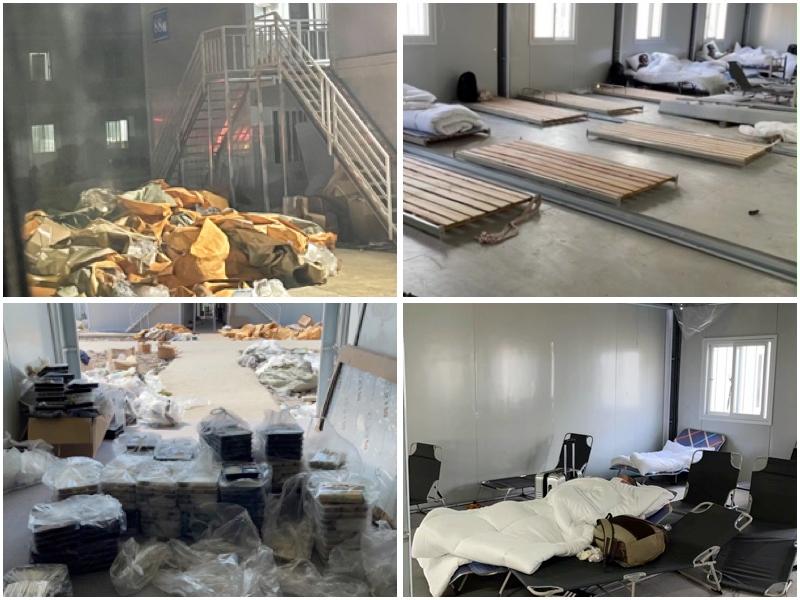
The woman who filmed the video said plastic-wrapped meals were stacked on the dust-covered ground for people to take, and the whole facility had only one toilet—which didn’t flush—despite the center’s purported capacity to house 1,000 people. Her post and any mention of the facility have been wiped from Weibo.
Another woman, who’s nearly 80 years old, described a similar situation after being sent to a makeshift quarantine center in Pudong. There was no bedding and no water, she told her son, who retold her experience in a Weibo post that attracted 107,000 likes. More than 90 people had to share two or three restrooms, where trash and cardboard lined the damp floor, which was smudged with muddy stains, photos the son shared online show.
Avoidable Tragedies
Medical attention has continued to be an issue for the frail and sick.Guo, a 65-year-old confined to his second-floor apartment in Shanghai, recently jumped from his balcony in a desperate bid to seek medical help for his 90-year-old mother, who was suffering from inflammatory lung disease, high blood pressure, and heart problems. Authorities had sealed off the building with a metal lock for days. The ambulance wouldn’t come, and calls to every public hotline went unanswered, he said.
“This government is completely dysfunctional,” he told The Epoch Times. “From top to bottom ... everyone is passing the buck.”
Asked by The Epoch Times about Guo’s plight, a local neighborhood committee worker said all regular officers have gone under quarantine. It’s currently manned by a group of volunteers, including herself, she said.
However, officials reacted quickly after Guo called for help online—but not to offer assistance. They called Guo’s nephew asking that the post be deleted, an irony that Guo noted bitterly.
“No one was around earlier, and they are back to life now,” he said.
Larry Hsien Ping Lang, a prominent Chinese economist, recently lost his mother after COVID-19 curbs in Shanghai delayed her medical treatment. The 98-year-old, suffering from kidney failure, was kept outside of the hospital emergency room for four hours while waiting for a negative COVID-19 test result. She died during the wait.
“The tragedy could have been avoided,” wrote Lang, who earlier this month had touted Shanghai’s virus response as a demonstration of “the power of China,” in a social media post. “Based on the past diagnosis, she just needed one dose of injection [for her kidney] to be alright.”
Lang was only allowed to leave his own neighborhood to go to the hospital after lengthy arguments with authorities, by which time his ailing mother had already died.
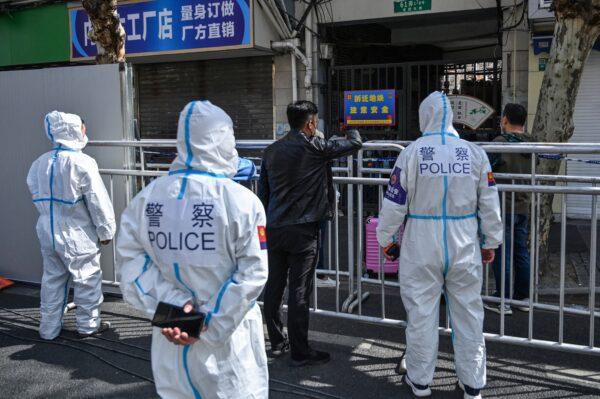
Anger Building
At least 15 million residents are still locked in their homes as of April 13.To vent their anger, residents in some neighborhoods have taken to banging on their cookware and screaming at the top of their lungs from the balconies of high-rise apartment buildings.
Videos shared with The Epoch Times also show locals shouting in unison “give us supplies” and at one point engaging in a scuffle with a pandemic worker clad in white.
Neither the city chief nor a senior regime official were kindly received when they recently made visits to residential neighborhoods.
Li Qiang, the Chinese Communist Party secretary of Shanghai, was cornered by several women airing similar complaints.
“You have committed a crime to the country,” said a woman walking a dog, a video circulating online shows. “You should be ashamed to face ancestors and heaven and earth.”
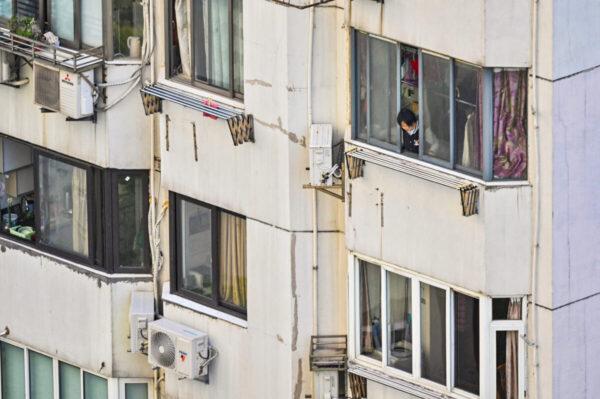
A woman from the compound, which has been sealed off since a month ago, said they were handed some rice and spoiled oranges just before and after Li’s visit. The rice would sustain her for five days, but she had no greens to go with it.
“I didn’t know Li Qiang was coming,” she told The Epoch Times. “Otherwise, I’d definitely have come down to have a good talk with him.
“The officials only answer to their bosses and never to the ordinary people.”
Enthusiasm among local officials responsible for frontline pandemic control seems to be waning as well.
In a letter dated April 9, the Hancheng neighborhood committee in Pudong stated that their staff have had enough after 24 days of being sealed in the office.
“We have tried our best to cooperate with different government policies. Everyone and every department want our understanding and cooperation, but no one cares about how we feel,” they wrote in the letter that was posted online.
“We are humans, too, not unfeeling machines. There’s also a time when we can’t bear it anymore.”
An officer from the nearby Renwen neighborhood committee, when called, confirmed their resignation.
“The pressure is quite considerable,” she told The Epoch Times.
Another neighboring office official said they'll “hold on for as long as [they] are able.”
“We also don’t know if we will not be able to keep going one day,” she told The Epoch Times.
Wu Yingchuan, who became the village committee secretary for Changli Garden in November, also posted a resignation letter on social media, saying that they had done their best to help the residents, but were caught between government policies and the needs of 4,000 residents.
For more than two weeks, they haven’t had a shower. Wu’s workers are falling ill due to physical exhaustion and the virus. The volumes of calls requesting help each day have been emotionally crushing. But they’ve had neither the manpower nor capacity to offer tangible help.
“Orders from above are final. But those who give these irrevocable orders have never been to the nucleic testing site,” he wrote. “They probably have no idea ... because of such an order, how many frontline workers and volunteers would get infected and how many people lost their sleep.”
Wu is currently still at work, according to a committee officer who confirmed the letter’s veracity when called by The Epoch Times.
“Every word and sentence in this letter is real,” the officer said.





